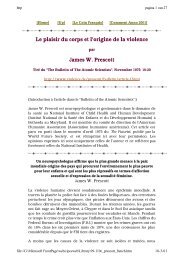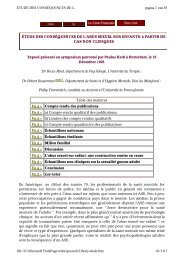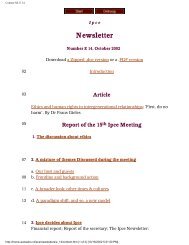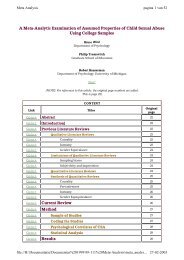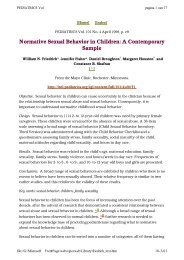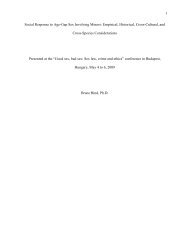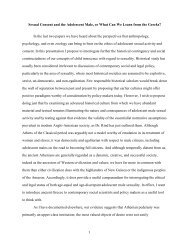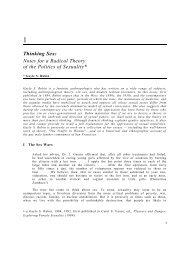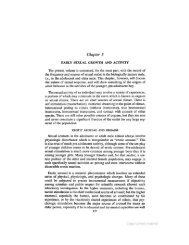Infant and Child Sexuality: A Sociological Perspective - Ipce
Infant and Child Sexuality: A Sociological Perspective - Ipce
Infant and Child Sexuality: A Sociological Perspective - Ipce
Create successful ePaper yourself
Turn your PDF publications into a flip-book with our unique Google optimized e-Paper software.
ate count as to the number who do, nor the frequency of occurrence for<br />
those who do. Several studies have dealt with the subject, some of them<br />
in a rather cursory manner. Based on data from interviews conducted<br />
prior to 1955 with boys (upper white collar class) with an average age<br />
of 7.2 years (age range was 4 to 14 years), Elias <strong>and</strong> Gebhard (1969)<br />
report that 38 percent reported having masturbated with more beginning<br />
in the 3-7 year age range than at any subsequent time. Miller <strong>and</strong> Swanson<br />
(1958) asked parents if, at or before age five, their children had<br />
“touched” their sex organs. About 58 percent of the mothers said that<br />
they had not, while some 34 percent said that they had. In the Sears<br />
study (Sears, Maccoby <strong>and</strong> Levin, 1957, p. 200), only two-fifths of the<br />
mothers said they had never noticed their children doing anything that<br />
could be referred to as masturbation. In a study involving two hundred<br />
<strong>and</strong> eighty four boys, Ramsey reports that five percent in the age group<br />
six or less had had masturbatory experience, <strong>and</strong> ten per cent of those<br />
seven years old. (Ramsey, 1943, p. 224). Many begin to masturbate<br />
later, <strong>and</strong> much early genital play is not recalled, observed, or reported.<br />
At about the age seven, or so, I first began to<br />
masturbate. I am not sure how I came upon this<br />
discovery. I believe it may have been when,<br />
feeling a need to urinate, I began fingering the<br />
genital area <strong>and</strong> found it to produce a very<br />
pleasurable sensation.<br />
Touching or holding the genitals is not necessarily associated with<br />
erotic pleasure; it appears to be a source of security for some infants<br />
when learning to walk or under other conditions during childhood,<br />
as in the following case.<br />
Near the age of six or seven holding the genitalia<br />
would give me a vague feeling of security. I<br />
would do this frequently in bed <strong>and</strong> it seemed<br />
almost an unconscious action that was associated<br />
with security.<br />
The child’s initial attempts at masturbation are inspired in many<br />
instances by the observation of other children engaging in such activity<br />
or through deliberate instruction given by some older child or<br />
adult. In the following case, a boy found a way to stimulate himself by<br />
accident <strong>and</strong> then passed it on to his peers. According to Kinsey, these<br />
are the first sources of information for most males. (Kinsey, 1953, p.<br />
107). The great majority of females who masturbate, on the other h<strong>and</strong>,<br />
learn to masturbate by discovering the possibility of such activity by<br />
themselves.<br />
I called the experience the “weiner tickle” when<br />
I spoke to others about it. It consisted of a<br />
form of self stimulation that occurred when I<br />
climbed up a pole in a swing set. The pole was<br />
set at an angle such that the penis was stimulated<br />
by rubbing against the smooth metal surface<br />
during the climbing process. I discovered<br />
this by accident <strong>and</strong> told certain of my friends<br />
about it. They also proceeded to try the “weiner<br />
tickle.” It was thought to be great fun.<br />
28



